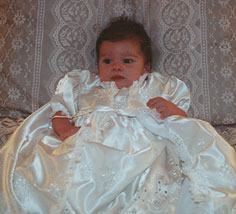The boy had to bring in to school an article about environmentalism – it could be about anything – about “global warming” or endagered species, or the Kyoto protocols, anything. They had to read the piece and write up a commentary on it. Extra credit.
Buster used this excellent piece by James K. Glassman, which I had actually linked to back in August:
In a surprise move that caught Europe’s smug moralists and the environmental movement’s noisy extremists flatfooted, the United States announced in Vientiane, Laos, last week that it was joining five other nations – China, India, Japan, South Korea and Australia — in a new pact that offers a refreshing and effective alternative route to tackling the problem of climate change.
While given short shrift by the puzzled media, this is a big deal, in many ways.
First, it breaks the climate-change deadlock. This is the agreement that responsible scientists and public officials have been seeking since the failure of the Kyoto Protocol became evident at the global warming conclave in Delhi two years ago. Call it “Beyond Kyoto” – Way Beyond Kyoto.
Second, the new deal was negotiated and settled without the involvement of the United Nations or the European Union – a clear message from the United States that multilateralism does not have a single definition…the agreement – called the Asia-Pacific Partnership on Clean Development and Climate — was kept secret by President Bush from British Prime Minister Tony Blair, an uncompromising champion of Kyoto, during last month’s G8 meeting” in Scotland.Third, the agreement comprises countries that account for 45% of the world’s population and about half the world’s economic output and greenhouse gas emissions, mainly carbon dioxide, implicated in raising surface temperatures….
Fourth and most important, it takes a pro-growth approach to combating the possibility of global warming in the century ahead. The new Beyond Kyoto agreement focuses on innovative technology as the antidote, not only to carbon-dioxide emissions but also to dirty air and economic deprivation…”
Never heard about all this, I bet? Neither had Buster’s teacher, who is pretty well-informed. It’s another one of those stories that just wasn’t considered worth covering by the US Press.
His fellow students were all surprised, as well. They’d not heard about it, but you know…”Bush is a moron and everything he does is bad and stupid and illegal and power-grabbing” was the general consensus, because that’s basically all the kids could find in their own reading.
Buster came home and said, “Hey, Ma!” (These days EVERY sentence begins with “hey,” which is starting to annoy me a little…) “do you remember earlier this year, wasn’t there some reason why Jon Stewart and everyone was saying, ‘maybe Bush was right after all? What was that about, again?’
By jove…the kid was right. I’d forgotten all about it, myself – I could remember reading (or seeing a tape) of Stewart looking panicked and saying the words, but I couldn’t remember what the issue was about.
Turns out Stewart -I can’t help it, I have a soft spot for him (I like olive skinned men and Jewish men…what can I say?) – was fretting because the first Iraqi election had been successful beyond anyone’s estimation:
Money quote from Fareed Zakaria to John Stewart:
“What I’m saying is that you and Ted Kennedy need to stop telling us to get out of there (Iraq).”
And Stewart to Zakaria:
“I’ve watched this thing unfold from the start, and, and, here’s the great fear that I have: what if Bush, the President, ours, has been right about this all along? I feel like my worldview will not sustain itself and I may – and again, I don’t know if I can physically do this – implode.”
Stewart, btw, was not the only Bush-hater cringing to say it. Not by a long shot.
But on the defining, fundamental question, Bush was right.
He understood that to defeat an idea, no matter how perverse and brutal it might be, it was necessary to have an opposite and superior idea.
He understood, in other words — instinctively rather than intellectually — that the only way to win a war against terrorism was to turn it into a war for democracy.
This is now happening. Against the quest of ordinary Iraqis for dignity and self-respect and freedom, the terrorists in Iraq had nothing ultimately to offer, except blood and hatred.
Already, Palestinians and Afghanis have made the same choice.
Even in Europe, IS BUSH RIGHT, AFTER ALL was the big question.
It was difficult not to cringe during Reagan’s speech in 1987. He didn’t leave a single Berlin cliché out of his script. At the end of it, most experts agreed that his demand for the removal of the Wall was inopportune, utopian and crazy.Yet three years later, East Germany had disappeared from the map. Gorbachev had a lot to do with it, but it was the East Germans who played the larger role. When analysts are confronted by real people, amazing things can happen. And maybe history can repeat itself. Maybe the people of Syria, Iran or Jordan will get the idea in their heads to free themselves from their oppressive regimes just as the East Germans did. When the voter turnout in Iraq recently exceeded that of many Western nations, the chorus of critique from Iraq alarmists was, at least for a couple of days, quieted. Just as quiet as the chorus of Germany experts on the night of Nov. 9, 1989 when the Wall fell.
Just a thought for Old Europe to chew on: Bush might be right, just like Reagan was then. )
Having refreshed our memories, Buster confided his theory to me, inspired by both his teacher’s sense of wonder in reading about the Bush environmental initiatives, and the memory of Stewart’s admission: “I think,” he said, “they hate Bush so much, because they saw that he had greatness in him, and he wasn’t supposed to be great. He was supposed to be, at best, slightly worse than his father.”
There might be something to that, after all. I mean, for months now better, smarter bloggers than I have tried to understand what it is about Bush that has driven so many people around the bend, and has even inspired journalists we formerly thought very well of to simply lose it where he is concerned.
Perhaps it is the narrative. Bush is not following the narrative. He was supposed to be a semi-harmless goofball the press and the Dems could run a few circles around before being defeated in 2004. Instead, 9/11 turned him into a president with strong ideas and stubborn resolve. He couldn’t be moved or swayed, not by editorial boards, not by marching millions, and..and…the 2002 election went his way! And his poll numbers wouldn’t go down, dammit, they just wouldn’t go down!
If this kept up, Bush 43 was actually going to have a LEGACY. A real one, and – if his ideas were successful -a staggering one.
There was only one way to change that: write and talk as much trash as they could, get it all on record. Suspect EVERYTHING. Denounce EVERYTHING (when was the last time you read a sentence about Democrats, re Bush, that used the word “support”? Now, think – how often are the headlines “Democrats denounce Bush” or “battle” or “decry”…) Pummel, pummel, pummel this guy, and eventually he’ll go down, and his legacy will be shattered and the narrative, which the press and the Dems were accustomed to controlling, would be safe.
It’s only a theory. It’s an idea. I put it out there because Buster has a way of coming at an issue in a fresh, unexpected way. As he just did. Bush wasn’t supposed to be this good.











